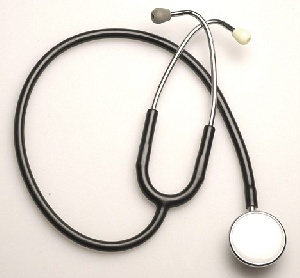 Stethoscope a medical equipment. File photo.
Stethoscope a medical equipment. File photo.
Mr. Albert Kofi Acquah, Chief Physiotherapist at the Cape Coast Teaching Hospital (CCTH), has expressed concern over the increasing cases of Cerebral Palsy (CP) disease reported at the facility.
He said the hospital, which hitherto recorded maximum of 15 cases of CP in a month, is currently recording as high as 60 cases from health facilities in and around Cape Coast and described the figure as disturbing and a big worry to the health authorities.
Mr Acquah expressed the concern at a meeting with parents and caregivers of CP children to enhance their knowledge on the management of the illness.
The meeting, organised by the Physiotherapy Unit of the Hospital in collaboration with Global Host Project (GHP), a United States-based non-governmental organisation, discussed the challenges associated with the disease.
It also sought to give the parents the basic handling techniques to be able to understand how to treat CP cases and continue with the physiotherapy at home.
Mr Acquah said the upsurge of the disease presented a huge economic and social cost to the nation.
He said there is the need for an intensified education for parents to understand the problem in order to ease the mental trauma that came to them as a result of the disease due to the societal stigma attached to it.
He asked pregnant mothers to visit antenatal clinics regularly and must endeavour to give birth at a health facility.
He also urged them to critically assess their children to see if they had any abnormalities at birth for the necessary interventions to be put place to address them.
Mr Acquah explained that “cerebral palsy comes about when the child fails to come out early from the birth canal to breathe its first air”.
“Once it is slot out of the mother’s womb it must come out quickly so that the first air will come out by a form of a cry, once the baby cries it gets the air and the oxygen begins to let the senses work so that the brain develops well.
"So if the oxygen does not go in early for the brain to start developing, the brain acts slowly," he added.
He said a child could also get CP out of severe malaria or any disease that could result in convulsions.
Dr Stephen Laryea, Head of the Paediatrics Department of the CCTH advised parents of children with CP to seek early medical help for appropriate interventions to be put in place to ensure their safety.
He said mothers must desist from applying glucose, breast milk and exposing their children to early morning sun when they noticed their babies have yellowish eyes and report promptly at a health facility for treatment.
He said such practices did not achieve any desired result but rather prolonged seeking proper interventions and eventually ended up with CP.
Dr Laryea expressed worry that majority of the hospitals in the country did not have enough facilities to help CP children reach their potential.
He appealed to corporate institutions and other philanthropist to assist the neonatal, photo-therapy and physiotherapy units at the various hospitals with machines and equipment to be able to adequately treat children with CP.
Mr Oduah Kwesi Sampson, Country Director and Co- Founder of GHP, Ghana said the organisation would facilitate forums, training sessions and education broadcast at the various hospitals within the Region to educate parents on the disease.
He said similar training sessions would be organised for the staff of the CCTH to make them aware of the differences that were necessary in care and treatment of individuals affected with disabilities.
He said GHP would continue to support the Cerebral Palsy Foundation to expand education and resource management.